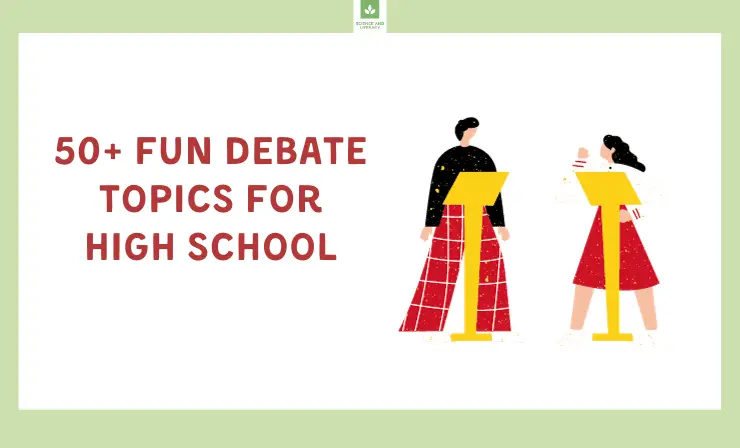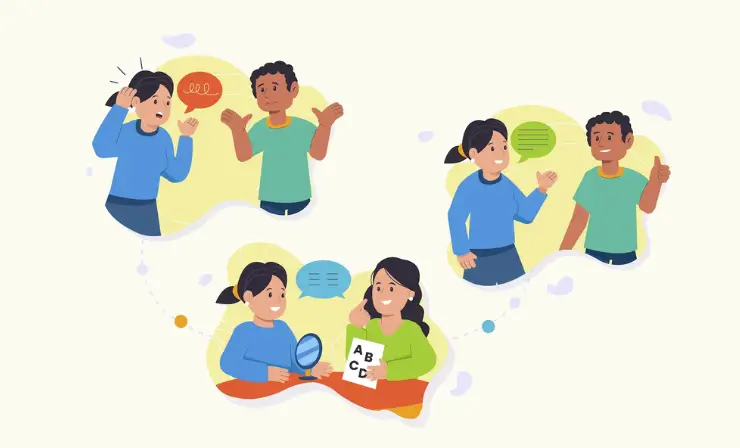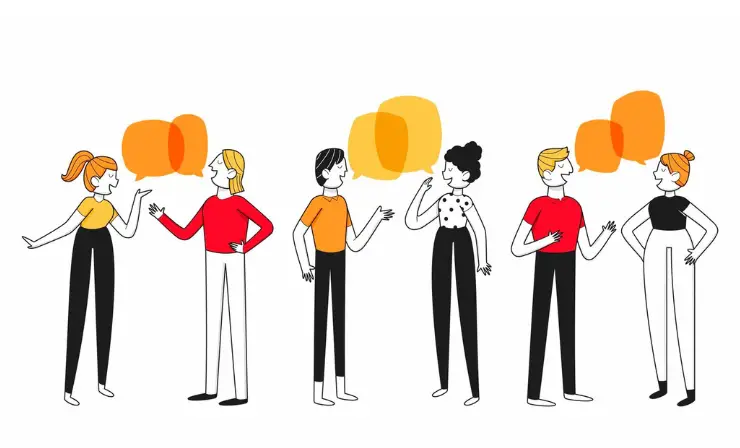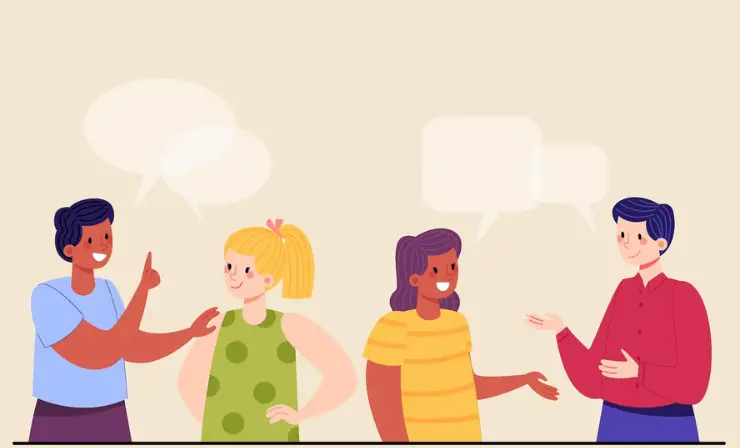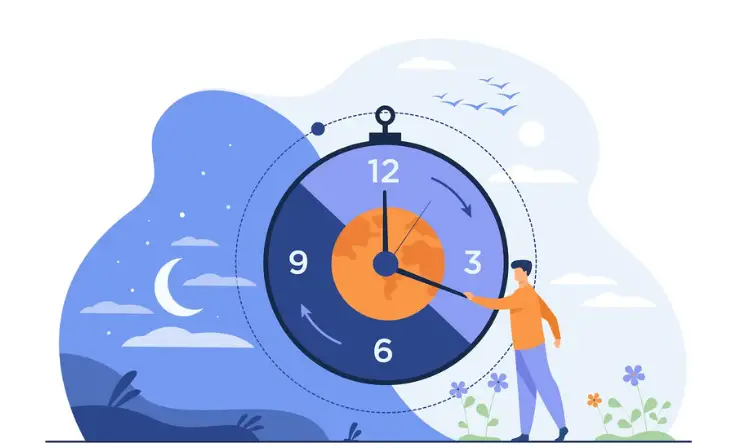| Topic | Description |
|---|
| 1. Would you like to live forever? | Advisable Age: High school and above What it Develops: Ethical reasoning, philosophical thinking Features: Provocative, sparks deep contemplation Best for: Encouraging philosophical discussions on the value of mortality |
| 2. Homework should be banned. Agree or disagree? | Advisable Age: Middle school and above What it Develops: Critical thinking, time management Features: Relevant to students, promotes critical analysis Best for: Encouraging students to think about the educational system and its demands |
| 3. McDonald’s is the best fast food restaurant. Agree or disagree? | Advisable Age: High school and above What it Develops: Persuasive skills, research abilities Features: Pop culture relevance, sparks lively discussions Best for: Fostering persuasive communication and the art of argumentation |
| 4. Summer is better than winter. Agree or disagree? | Advisable Age: Middle school and above What it Develops: Comparative analysis, subjective reasoning Features: Seasonal relevance, invites personal opinions Best for: Exploring individual preferences and the art of persuasion |
| 5. Who are better teachers? Men or women? | Advisable Age: High school and above What it Develops: Gender studies, research skills Features: Gender-related debate, encourages research and analysis Best for: Exploring gender dynamics in education and promoting research skills |
| 6. Children under 16 should be allowed to vote. Agree or disagree? | Advisable Age: High school and above What it Develops: Civic awareness, ethical reasoning Features: Provocative, encourages critical thinking Best for: Promoting civic engagement and ethical discussions among students |
| 7. Children shouldn’t be allowed cell phones until they are over 18. Agree or disagree? | Advisable Age: Middle school and above What it Develops: Technology ethics, argumentation skills Features: Technology-related debate, sparks discussions on parenting and technology use Best for: Encouraging critical discussions on responsible technology use |
| 8. Clowns are scary. Agree or disagree? | Advisable Age: Middle school and above What it Develops: Emotional intelligence, persuasive skills Features: Unconventional topic, encourages exploring emotions Best for: Promoting emotional intelligence and the ability to express fears and preferences |
| 9. Math is an important subject to learn. Agree or disagree? | Advisable Age: Middle school and above What it Develops: Logical reasoning, academic importance Features: Educational relevance, sparks discussions on the value of math Best for: Encouraging logical reasoning and discussions on the importance of math education |
| 10. Would you rather be good at sports or good at exams? | Advisable Age: High school and above What it Develops: Value judgments, personal preferences Features: Personal choice debate, encourages self-reflection Best for: Exploring personal values and preferences in sports and academics |
| 11. Kids are smarter than grown-ups. Agree or disagree? | Advisable Age: Middle school and above What it Develops: Perspective analysis, argumentation skills Features: Controversial, sparks discussions on intelligence Best for: Encouraging students to think critically about intelligence and age-related perspectives |
| 12. Is it better to be rich with no friends or poor with many friends? | Advisable Age: High school and above What it Develops: Value judgments, ethical reasoning Features: Ethical dilemma debate, encourages moral discussions Best for: Promoting ethical reasoning and discussions on the value of wealth and friendship |
| 13. It is important to wear a uniform at school. Agree or disagree? | Advisable Age: Middle school and above What it Develops: Uniform policy analysis, persuasive skills Features: School-related debate, sparks discussions on dress codes Best for: Encouraging discussions on uniform policies and individual expression |
| 14. Should teachers have to wear a school uniform? | Advisable Age: High school and above What it Develops: School policy analysis, argumentation skills Features: Education-related debate, encourages discussions on teacher dress codes Best for: Promoting critical analysis of teacher dress code policies |
| 15. Candy should be given as a reward in class. Agree or disagree? | Advisable Age: Middle school and above What it Develops: Behavior incentives, persuasive skills Features: Classroom policy debate, sparks discussions on rewards Best for: Encouraging discussions on behavior management and classroom incentives |
| 16. Are bad words bad? | Advisable Age: High school and above What it Develops: Language ethics, argumentation skills Features: Language-related debate, encourages discussions on profanity Best for: Promoting language ethics and exploring the impact of words |
| 17. Students should be paid to go to school. Agree or disagree? | Advisable Age: Middle school and above What it Develops: Economic analysis, argumentation skills Features: Education-related debate, sparks discussions on incentives Best for: Encouraging discussions on education incentives and economics |
| 18. Which makes a better pet? Cats or dogs? | Advisable Age: High school and above What it Develops: Comparative analysis, personal preferences Features: Pet preference debate, invites personal opinions Best for: Exploring individual pet preferences and persuasive communication |
| 19. What came first? The chicken or the egg? | Advisable Age: Middle school and above What it Develops: Philosophical reasoning, logical thinking Features: Philosophical debate, sparks discussions on origins Best for: Encouraging philosophical thinking and logical analysis |
| 20. ‘Smart phones’ make us stupid. Agree or disagree? | Advisable Age: High school and above What it Develops: Technology impact analysis, argumentation skills Features: Technology-related debate, encourages discussions on smartphone use Best for: Promoting critical analysis of technology’s impact on intelligence |
| 21. What’s the best pizza topping? | Advisable Age: Middle school and above What it Develops: Culinary preferences, persuasive skills Features: Food-related debate, sparks discussions on culinary tastes Best for: Encouraging discussions on food preferences and persuasive communication |
| 22. What’s more important? Being good-looking or being smart? | Advisable Age: High school and above What it Develops: Value judgments, personal preferences Features: Personal choice debate, encourages self-reflection Best for: Exploring personal values and preferences in appearance and intelligence |
| 23. Playing video games is bad for health. Agree or disagree? | Advisable Age: Middle school and above What it Develops: Health impact analysis, argumentation skills Features: Health-related debate, encourages discussions on gaming habits Best for: Promoting critical analysis of video game effects on health |
| 24. No one should ever tell a lie. Agree or disagree? | Advisable Age: High school and above What it Develops: Ethics analysis, moral reasoning Features: Ethical debate, sparks discussions on honesty Best for: Encouraging moral discussions and exploring the concept of honesty |
| 25. Which is a better dessert? Cake or ice cream? | Advisable Age: Middle school and above What it Develops: Culinary preferences, persuasive skills Features: Dessert preference debate, invites personal opinions Best for: Exploring individual dessert preferences and persuasive communication |
| 26. Humans are the most dangerous animals on the planet. Agree or disagree? | Advisable Age: High school and above What it Develops: Environmental ethics, argumentation skills Features: Environmental debate, encourages discussions on human impact Best for: Promoting critical analysis of human impact on the environment |
| 27. Should students be allowed to use cell phones in class? | Advisable Age: Middle school and above What it Develops: Technology policy analysis, argumentation skills Features: Education-related debate, sparks discussions on cellphone use Best for: Encouraging discussions on technology policies in schools |
| 28. Which is better? Tap water or bottled water? | Advisable Age: High school and above What it Develops: Environmental analysis, argumentation skills Features: Environmental debate, encourages discussions on water sources Best for: Promoting critical analysis of water choices and environmental impact |
| 29. Would you rather be poor and honest or rich and dishonest? | Advisable Age: Middle school and above What it Develops: Value judgments, ethical reasoning Features: Ethical dilemma debate, encourages moral discussions Best for: Encouraging ethical reasoning and exploring the concept of wealth and integrity |
| 30. Would you rather be the main superhero or the sidekick? | Advisable Age: High school and above What it Develops: Role analysis, personal preferences Features: Superhero debate, invites personal opinions Best for: Exploring individual preferences in hero roles and persuasive communication |
| 31. Would you rather travel 100 years forward or back in time? | Advisable Age: Middle school and above What it Develops: Temporal reasoning, value judgments Features: Time travel debate, sparks discussions on historical perspectives Best for: Encouraging discussions on time travel choices and exploring historical eras |
| 32. Would you rather be able to fly or read people’s minds? | Advisable Age: High school and above What it Develops: Superpower analysis, personal preferences Features: Superpower debate, encourages self-reflection Best for: Exploring individual preferences in superhuman abilities and persuasive communication |
| 33. If you could have one superpower, which one would you choose? | Advisable Age: Middle school and above What it Develops: Superpower analysis, personal preferences Features: Superpower preference debate, invites personal opinions Best for: Encouraging discussions on the appeal of superhuman abilities and persuasive communication |
| 34. Is it possible for a boss and a subordinate to be good friends? | Advisable Age: High school and above What it Develops: Relationship analysis, ethical reasoning Features: Workplace ethics debate, sparks discussions on professional relationships Best for: Promoting ethical discussions and exploring professional dynamics |
| 35. Are humans meant to eat to live or live to eat? | Advisable Age: Middle school and above What it Develops: Philosophical reasoning, cultural analysis Features: Philosophical debate, encourages discussions on food and culture Best for: Encouraging philosophical thinking and exploring the cultural significance of food |
| 36. Is social media making us more connected or just making it easier for people to stalk each other? | Advisable Age: High school and above What it Develops: Social media analysis, argumentation skills Features: Technology debate, sparks discussions on social media’s impact Best for: Promoting critical analysis of social media’s influence on connectivity and privacy |
| 37. Is Twitter creating a toxic culture or helping us stay connected? | Advisable Age: Middle school and above What it Develops: Social media analysis, argumentation skills Features: Technology debate, encourages discussions on Twitter’s role Best for: Encouraging critical analysis of Twitter’s influence on online culture and connectivity |
| 38. Is it better to be TikTok famous or Instagram famous? | Advisable Age: High school and above What it Develops: Social media analysis, personal preferences Features: Social media preference debate, invites personal opinions Best for: Exploring individual preferences in social media platforms and persuasive communication |
| 39. Should Facebook add a ‘dislike’ button? | Advisable Age: Middle school and above What it Develops: Social media policy analysis, argumentation skills Features: Technology debate, sparks discussions on user interactions Best for: Promoting discussions on social media policies and user experience |
| 40. Is iOS better than Android? | Advisable Age: High school and above What it Develops: Technology preference analysis, persuasive skills Features: Technology preference debate, encourages debates on operating systems Best for: Exploring individual preferences in mobile operating systems and persuasive communication |
| 41. Is the law too easy on celebrities? | Advisable Age: Middle school and above What it Develops: Legal ethics analysis, argumentation skills Features: Celebrity ethics debate, sparks discussions on legal systems Best for: Encouraging discussions on the legal treatment of celebrities and ethical considerations |
| 42. Are books better than movies? | Advisable Age: High school and above What it Develops: Media comparison analysis, persuasive skills Features: Media preference debate, encourages debates on storytelling mediums Best for: Exploring individual preferences in storytelling mediums and persuasive communication |
| 43. Does intelligent alien life exist? | Advisable Age: Middle school and above What it Develops: Extraterrestrial analysis, critical thinking Features: Extraterrestrial debate, sparks discussions on the possibility of life beyond Earth Best for: Encouraging critical analysis of the potential existence of intelligent extraterrestrial life |
| 44. Are introverts too quiet, or are extroverts too loud? | Advisable Age: High school and above What it Develops: Personality analysis, argumentation skills Features: Personality debate, encourages discussions on introversion and extroversion Best for: Promoting discussions on personality traits and societal perceptions |
| 45. Should teens be allowed to get tattoos? | Advisable Age: Middle school and above What it Develops: Ethical reasoning, personal choices Features: Tattoo ethics debate, sparks discussions on body modification Best for: Encouraging ethical discussions on body art and personal choices |
| 46. Is cheating on a test ever justifiable? | Advisable Age: High school and above What it Develops: Ethics analysis, moral reasoning Features: Academic ethics debate, encourages discussions on integrity Best for: Promoting ethical discussions and exploring the concept of academic honesty |
| 47. Is peer pressure doing more harm than good? | Advisable Age: Middle school and above What it Develops: Social influence analysis, argumentation skills Features: Peer pressure debate, sparks discussions on social dynamics Best for: Encouraging critical analysis of peer pressure’s impact on individuals |
| 48. Should yearbook quotes be funny or serious? | Advisable Age: High school and above What it Develops: Yearbook quote analysis, persuasive skills Features: Yearbook quote debate, invites discussions on yearbook traditions Best for: Exploring the purpose of yearbook quotes and persuasive communication |
| 49. Should high school students wear whatever they want to school? | Advisable Age: Middle school and above What it Develops: Dress code analysis, argumentation skills Features: School dress code debate, encourages discussions on self-expression Best for: Promoting discussions on dress code policies and individuality |
| 50. Are movies creating an unrealistic idea of what high school is like? | Advisable Age: High school and above What it Develops: Media analysis, critical thinking Features: High school portrayal debate, sparks discussions on media influence Best for: Encouraging critical analysis of how media represents high school experiences |
| 51. Is there too much pressure on high school students to pick a career path? | Advisable Age: Middle school and above What it Develops: Career pressure analysis, argumentation skills Features: Career choice debate, encourages discussions on educational expectations Best for: Promoting discussions on the pressures students face when selecting career paths |
| 52. Pluto should still be considered a planet. | Advisable Age: High school and above What it Develops: Astronomical analysis, critical thinking Features: Planetary debate, sparks discussions on astronomical classifications Best for: Encouraging critical analysis of astronomical classifications and Pluto’s status |
| 53. We should allow people to go barefoot anywhere if they want to. | Advisable Age: Middle school and above What it Develops: Social norms analysis, argumentation skills Features: Barefoot freedom debate, encourages discussions on societal norms Best for: Promoting discussions on personal freedom and societal expectations |
| 54. People shouldn’t have to go to school or work on their birthdays. | Advisable Age: High school and above What it Develops: Birthday celebration analysis, ethical reasoning Features: Birthday debate, sparks discussions on special occasions Best for: Encouraging ethical discussions on birthdays and personal time |
| 55. Expanded use of artificial intelligence will be good for humanity. | Advisable Age: Middle school and above What it Develops: AI analysis, critical thinking Features: AI impact debate, encourages discussions on technology advancements Best for: Promoting critical analysis of the potential benefits of artificial intelligence |
| 56. Technology is creating more jobs than it eliminates. | Advisable Age: High school and above What it Develops: Job market analysis, argumentation skills Features: Tech job debate, sparks discussions on automation and employment Best for: Encouraging discussions on the impact of technology on the job market |
| 57. Video games are better than board games. | Advisable Age: Middle school and above What it Develops: Gaming preference analysis, persuasive skills Features: Gaming preference debate, invites discussions on gaming mediums Best for: Exploring individual preferences in gaming and persuasive communication |
